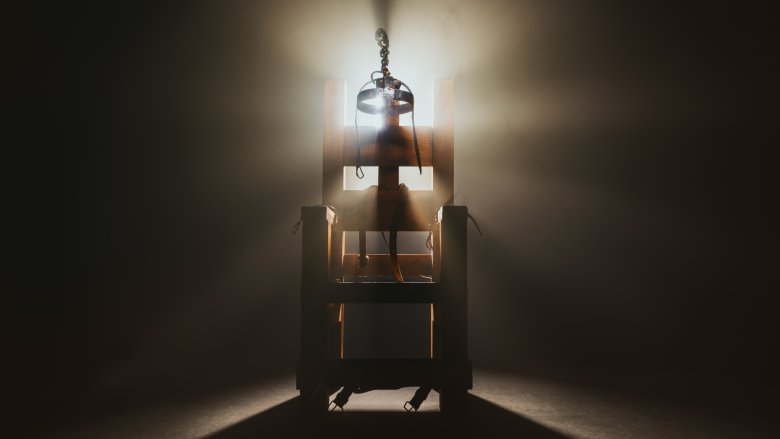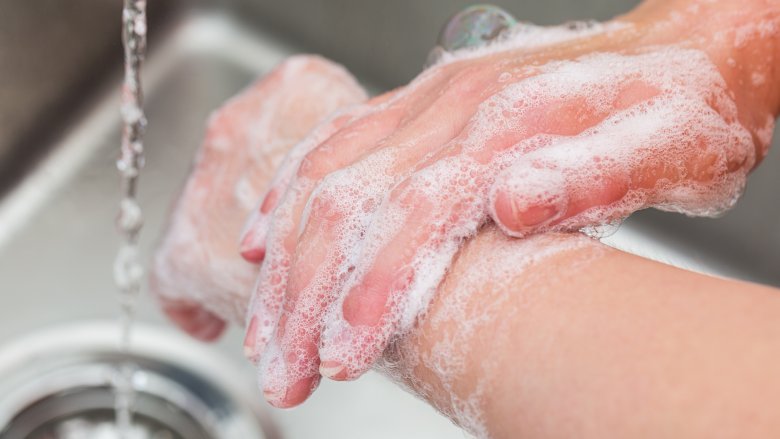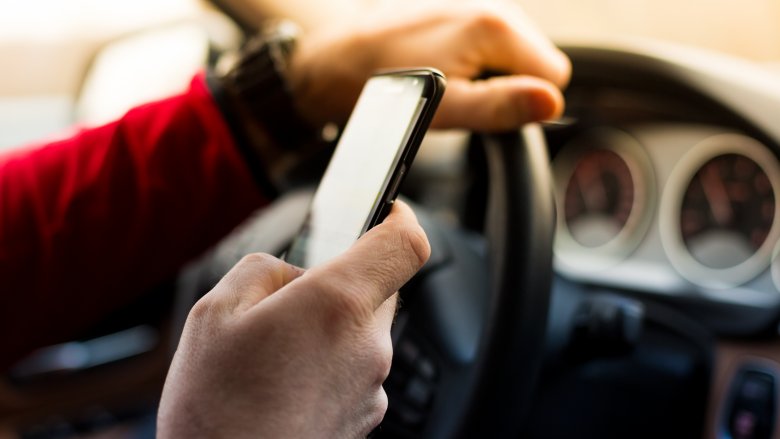Statistics That Will Completely Freak You Out
Statistics can be used to support just about any argument — you can spin a statistic, you can fail to mention a statistic, or you can use it as-is to prove a point, depending on what you're trying to accomplish. A 90 percent survival rate sounds a lot more positive than a death rate of 1 in 10, but it's the same number. The difference is in the way it's presented. This basically means you should view all the following statistics with some healthy skepticism because interpretation is in the mind of the beholder. Except for the one about spiders. That one you should take very, very seriously.
Cancer is only somewhat more likely to kill you than your doctor
The third leading cause of death in America is not car accidents or diabetes or influenza, it's preventable medical errors. While cancer takes out roughly 600,000 people every year, preventable medical errors claim the lives of up to 400,000 people.
A study published in the Journal of Patient Safety puts the blame for this terrifying statistic squarely on the shoulders of America's inadequate medical system, where demand outpaces supply and patients are constantly moving from one provider to another in search of affordable care. According to the study, doctors and nurses who work in understaffed medical facilities suffer from fatigue and burn-out, and are therefore more likely to make dangerous or even deadly mistakes. These mistakes range from disease that might be passed on through contaminated medical equipment to a failure to give a patient the best care available for his or her specific medical condition.
That's not to say you should avoid hospitalization — hospitals still save many more people than they accidentally kill, but it does make a pretty good argument in favor of being your own health advocate. You shouldn't just consult Doctor Google, but you might want to get a second opinion from another doctor if you have the time and ability.
1 in 7 U.S. adults is functionally illiterate
Say what you will about it, but our public school system guarantees that every child graduates high school and that they know how to read and write when they do. But it isn't happening.
Illiteracy in the United States is a much bigger problem than most people believe it is — one in seven Americans is functionally illiterate, which is a term used to describe a person who can read a few words but doesn't understand enough written language to get by in modern society. According to Huffington Post, the literacy rate in the U.S. is holding steady, with as much as 14 percent of the population having a "below basic" ability to read and write.
What's particularly terrifying about that statistic is its correlation to the crime rate in America. Up to 85 percent of juveniles in the criminal justice system are described as functionally illiterate, and 70 percent of American prison inmates can only read at or below a fourth-grade level. So it follows that we might want to try some adjustments to make sure there really is a guarantee that our kids will stay in school long enough to read and write. Groundbreaking idea, isn't it?
1 in 4 people who confess to crimes are actually innocent
Strangely, people who confess to crimes aren't always guilty. Now, that sounds completely crazy. Why would anyone falsely confess to someone else's crime? According to the Innocence Project, the answer makes a lot more sense than you might think.
Police interrogation is highly stressful. Suspects are often left alone in interrogation rooms for hours, and then they may be threatened, coerced, or lied to. Interrogators might promise a quick release in exchange for "the truth" when what they actually want is a confession, truthful or not. These manipulative tactics might persuade innocent people to confess to a crime simply because suspects become physically and emotionally exhausted and feel that a confession is the only way out. Suspects might also be intoxicated or mentally impaired, or may not understand the gravity of the situation they're in. And juveniles in particular are especially prone to making false confessions, simply because children are easier to coerce and don't fully understand the law.
So what do you do if you find yourself in an interrogation room even though you haven't committed a crime? You've watched cop dramas, so you've memorized the Miranda rights. "You have a right to an attorney" means you don't have to say anything without your lawyer there. And you shouldn't, because one night in jail is infinitely better than lethal injection, as if you had to be reminded.
Not everyone who gets executed in America is guilty
Most of us believe in our criminal justice system, at least to a certain degree. Crime doesn't pay, right? Except that deep down inside we know that it sometimes does, and what's worse, deep down inside we also know that innocence doesn't always protect you from prosecution or conviction — even for crimes with the worst possible punishment.
A 2014 study estimated that roughly 4 percent of the people who are on death row in the United States are likely innocent, and researchers think that's a "conservative estimate." According to the Michigan Innocence Clinic, wrongful convictions might occur because of poor identifications, "bad lawyering," junk science, or even police or prosecutorial misconduct — where investigators may use unethical practices to ensure a conviction even if there isn't much evidence to support the guilt of a defendant.
You don't have to be a criminal type to get wrongfully convicted, either. Sometimes it's enough to just have a relationship with a murder victim. In the United States, at least a third of female murder victims are killed by their male partners, so if you're married to or dating someone who dies suspiciously, you're automatically a suspect. And whether you're convicted may depend less on your actual innocence than it does on how badly police would like to close the case. Statistics are fun.
The average person spends two to three years waiting in line
If you've ever complained that the line you're standing in is taking forever, you're not totally right. But you're pretty close. According to NPR, the average person waits in line for a total of two to three years during the course of their life. That's comparable to how much time you'll spend doing laundry (three years), and is roughly half the amount of time you'll spend eating (around four and a half years) or talking on the phone at the office (four years). It's also considerably less time than you spend watching TV, which for most people amounts to around 11 years.
What's the answer to the standing-in-line problem? The internet may be rotting our brains and destroying our families, but it does have one huge benefit — when you use websites to pay bills, make purchases, and order services, you're significantly cutting back on the amount of time you spend standing in line. That doesn't help you out a whole lot at Disneyland, but at least at Disneyland you get some kind of reward in exchange for giving up percentage points of your productive lifespan.
1 in 4 men doesn't wash his hands after using the bathroom
It's true that women are guilty, too — roughly 1 in 10 doesn't wash her hands after visiting the restroom, but that sort of pales in comparison to the 25 percent of men who don't bother to wash up after touching public restroom doors, toilet seats, flushers, or themselves. If there's anything amusing about this statistic it's that almost everyone who doesn't wash their hands after using the bathroom totally lies about it — in a Harris Interactive poll, a full 91 percent of those surveyed said they always wash up after their business. But then researchers got clever and spied on people's public restroom habits, and as it turns out, the actual number is closer to 82 percent. And men are the worst offenders.
Apparently it also seems to matter where those restroom users might be — it's sort of comforting to know you don't have to worry so much about patrons at the farmer's market handling fresh produce with their unwashed hands (88 percent of those people were observed washing their hands after using the restroom), but you might want to avoid shaking hands at a sporting event — only 74 percent of those who went to a game at Turner Field in Atlanta bothered to wash up after visiting the public restroom. And then they probably went and ate hot dogs. Eww.
3 feet from a spider
This is something people argue about. And for the arachnophobic, or for the arachnologist, it's an important question. If you're afraid of spiders or if you study them, it definitely matters how far away you are from one at any given point in time.
There are several versions of it, but the gist of the real statistic is this: When you're outdoors, you're never more than 3 feet away from a spider. Now, this fact is debatable depending on where exactly you are. For example, if you're in a parking lot you could be a couple hundred feet from a spider if you're lucky. But if you're out for a stroll in the woods or if you're sitting on a lawn chair in your backyard, then yeah, one of those fuzzy, eight-eyed instruments of horror is probably more or less within arm's reach.
According to Arthropod Ecology, a 2000 study found that there were roughly three adult wolf spiders per square meter in European agroecosystems, and that's just wolf spiders. That's not even taking into consideration house spiders, orb spiders, barn spiders, hobo spiders, jumping spiders, crab spiders, black widows, brown recluses, or Goliath bird-eating spiders. Yes, if you fear spiders, you should either never leave your house or move to Antarctica, which is blissfully free of arachnids, unless you count giant sea spiders, which you probably do, so really nowhere is safe.
Cell phones cause more than a quarter of all car crashes
It's probably not a huge shock to you that cell phones cause about 25 percent of all traffic crashes in the U.S., but that doesn't make it any less terrifying. We've all almost been hit by some moron who has a cell phone in one hand and a cheeseburger in the other. But what you might be hiding from yourself is your own culpability in this little truism — according to federal statistics, more than 650,000 people admit to using phones while driving in daylight, and that's just the people who will actually admit to it. Most of the people reading this have at one time or another been guilty of texting and driving. And the rest of you probably have, too, but just aren't going to tell anyone.
"But it's okay if I do it because I'm a good driver." That's pretty much the same excuse everyone gives, and it's eerily similar to the excuse some people give for drinking and driving, too. But the fact is that drinking and driving might actually be safer than cell phone use, even if you're using a hands-free device. A University of Utah study found that drunk drivers were actually less likely to crash than drivers who were talking on cell phones. And statistically speaking, deaths related to distracted drivers are on the rise, while deaths related to drunk drivers are declining.
Saving the world is harder than Superman makes it look
In 2010, the international community agreed that the planet should warm no more than 2 degrees Celsius above the pre-industrial global temperature average, which amounts to 3.6 degrees in American. That 3.6-degree threshold is where the damage to civilization starts to get pretty dire, according to climate models that date all the way back to the 1970s.
Okay, cool, but that's not going to be easy. According to Grist, we won't be able to achieve that number unless we cut current emissions worldwide by 40 to 70 percent between now and 2050, and reach zero emissions by 2100. So what if we can't do that? That could mean the end of the Greenland ice sheet, and once that goes, sea level will rise by as much as 23 feet, which will wipe out most of our coastal cities, displacing millions of people. Ultimately, that means you should really not be investing in coastal real estate right now because it's a terrible idea. You know those giant sea walls we saw in Blade Runner 2049? Maybe those would be a good investment.
Your kids are not safe online
This is another one of those, "Well, duh" statistics. Of course we all instinctively know that our children are not safe online. The Internet is full of 55-year-olds pretending to be 12-year-olds and predators trying to lure kids away from their homes for clandestine meetings or recruiters trying to get them to join terrifying cults. Even sites meant for kids aren't 100 percent safe — predators may deliberately target kids' sites because they know they're going to find an ample supply of vulnerable children.
According to CNN, the number of kids contacted by sexual predators online is on the decline, but as of 2010 at least 9 percent of tech-savvy kids are still reporting that they've received an unwanted solicitation via the internet. A shocking 42.1 percent of kids say they've been exposed to inappropriate content, and one in 20 say they've arranged a secret meeting with an online friend.
So what's the best way to combat all this? Mostly, don't let your kids use the internet, which is going to be a pretty tough sell in a world where teachers are assigning online homework and giving extra-credit for playing math games on the internet and accessing typing apps. Shared Hope International suggests a better option: choosing online activity apps that restrict and monitor internet use. In other words, it's okay to spy in your kids because their lives might literally depend on it.










